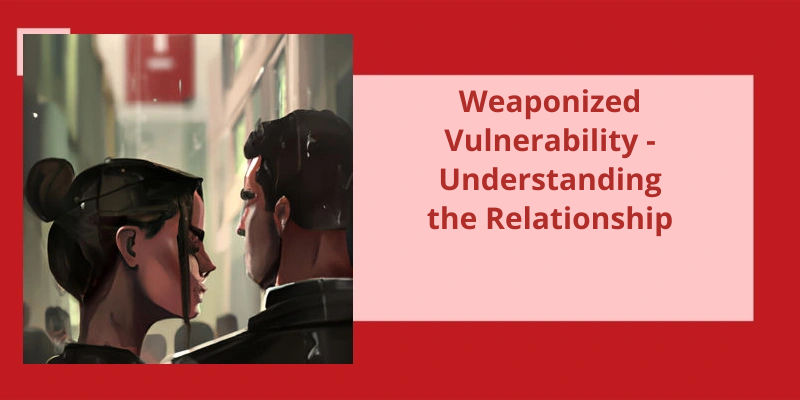Family dynamics can be complex and challenging, especially when a loved one marries someone with narcissistic tendencies. Such a situation can lead to upheaval, misunderstandings, and even emotional distress for those involved. It’s important to understand the inherent difficulties and find effective strategies to navigate these relationships in a way that protects both your brother and your own well-being. In this article, we will delve into the topic of "My Brother Married a Narcissist – Best Hacks," exploring valuable insights and practical solutions that can help you support your brother, maintain healthy boundaries, and potentially even foster positive change within the marriage. By understanding the nature of narcissism, implementing effective communication techniques, and prioritizing self-care, you can navigate this challenging situation with resilience and compassion.
How Can I Be Happy When Married to a Narcissist?
Being in a marriage with a narcissist can be an incredibly challenging and emotionally draining experience. It’s natural to question how one can find happiness in such a situation. However, it’s important to remember that with the right mindset and strategies, it’s possible to find moments of contentment and even personal growth. A few hacks can help you navigate this difficult journey.
Firstly, it’s crucial to listen to yourself. Take the time to really listen to your own thoughts, needs, and emotions. By understanding yourself better, you can begin to establish healthy boundaries and protect your own well-being. Additionally, doing a self-inventory allows you to identify your own strengths, passions, and sources of happiness that exist independently of your spouse.
Reinforcing positive behavior, both within yourself and your partner, is another effective strategy. Focus on highlighting and praising any positive actions or qualities you notice, as this can help foster a more positive and harmonious atmosphere within your marriage. Additionally, practicing mindfulness in your own life can significantly improve your well-being. Incorporating mindfulness into your relationship can encourage self-reflection and empathy, which are valuable when dealing with a narcissistic spouse.
Being realistic about your expectations is also crucial. Accepting that your spouse may never change or acknowledge their narcissistic tendencies can help you manage your own emotions and reduce frustration. This doesn’t mean giving up hope entirely, but rather focusing on what’s within your control – your own actions and choices.
Lastly, honesty with yourself is paramount. Admitting and acknowledging your own feelings of unhappiness, frustration, or even anger is essential for personal growth and finding strategies to cope with the situation. Seek support from trusted friends or therapists who can provide guidance and understanding. Remember, your own happiness is vital, and by prioritizing self-care and personal growth, you can still find moments of joy even in the midst of challenging circumstances.
Coping Mechanisms for Dealing With Gaslighting or Emotional Manipulation From a Narcissistic Partner
- Seek support from a trusted friend or family member.
- Consider speaking with a therapist or counselor who specializes in narcissistic abuse.
- Educate yourself about narcissism and gaslighting to better understand the dynamics at play.
- Set boundaries and communicate your needs clearly and assertively.
- Practice self-care activities such as exercise, meditation, or engaging in hobbies you enjoy.
- Keep a journal to document and validate your experiences.
- Build a strong support network of individuals who can provide validation and assistance.
- Read books or articles that focus on healing from narcissistic abuse.
- Consider joining a support group or online community for survivors of narcissistic abuse.
- Avoid engaging in arguments or trying to prove your reality to the narcissistic partner.
Being married to a narcissist can have profound and long-lasting effects on a person’s well-being and sense of self. The constant manipulation, gaslighting, and emotional abuse can chip away at one’s self-esteem, leaving them feeling inadequate, powerless, and trapped. The narcissistic partner’s relentless need for attention and validation often pushes away any healthy connections the individual may have had with friends and family. Moreover, the narcissist may control the finances and resources, making it difficult for the person to leave the toxic relationship. As a result, the victim may experience a range of mental health struggles, such as anxiety, depression, complex trauma, and even post-traumatic stress disorder. The corrosive impact of being married to a narcissist shouldn’t be underestimated, and it’s essential for those affected to seek support and therapy to reclaim their sense of self and rebuild their lives.
What Does Being Married to a Narcissist Do to a Person?
Being married to a narcissist can have devastating effects on a persons well-being and sense of self. One of the most common outcomes is a significant decline in self-esteem. Narcissists are notorious for manipulating and belittling their partners, constantly gaslighting them and making them question their worth. Over time, this constant emotional abuse erodes their self-confidence and leaves them feeling unworthy and insignificant.
Narcissists are known for their ability to isolate their partners from friends and family, making them dependent on the narcissist for emotional support and companionship. This can result in a deep sense of loneliness and a lack of support network, with no one to turn to for help or perspective.
Another consequence of being married to a narcissist is restricted access to resources needed to leave the relationship. Financial dependence on the narcissist further traps the person in the toxic dynamic, leaving them feeling trapped and without options.
Mental health struggles are a common result of the narcissistic abuse endured in a marriage. The constant manipulation and gaslighting can lead to anxiety, depression, and even post-traumatic stress disorder (PTSD). The person may constantly second-guess themselves and live in a state of fear and hypervigilance. Over time, these mental health struggles can become debilitating, affecting all aspects of their life.
It can result in low self-esteem, restricted access to healthy connections, limited resources to leave the relationship, and mental health struggles as a result of enduring narcissistic abuse. It’s vital for individuals in such situations to seek support and find ways to break free from the cycle of abuse, rebuilding their lives and reclaiming their sense of self-worth.
It’s essential to recognize the signs of narcissistic behavior in a spouse, as it can have detrimental effects on your emotional well-being. Narcissists tend to prioritize their own desires above all else, using a range of techniques to control and exploit their partners. While they may appear charismatic and personable to others, behind closed doors, their treatment can become manipulative and abusive. Understanding these patterns is crucial for safeguarding your own mental and emotional health within the relationship.
How a Narcissist Treats His Spouse?
Living with a narcissistic spouse can be an incredibly challenging and emotionally draining experience. Narcissists are experts at charming and manipulating those around them, gaining the admiration and support of others while simultaneously treating their spouse with disrespect and disdain. They excel in exploiting their spouses vulnerabilities and manipulating them to meet their own needs and wants.
One of the main tactics a narcissistic spouse will employ is manipulation. They’ve a deep understanding of their spouses weaknesses and insecurities and will use this knowledge to control and manipulate their behavior. Gaslighting, for example, is a common technique where the narcissist will distort the truth and make their spouse question their own reality, leaving them feeling confused and unsure of themselves.
Charismatic behavior is another hallmark of a narcissistic spouse. They can be extraordinarily charming and charismatic, especially when trying to win over others or elicit admiration. However, behind closed doors, this charm often fades, and the spouse is left feeling isolated and unimportant.
They’ve a knack for taking advantage of their spouses kindness and generosity, often expecting them to cater to their every need without reciprocity. Whether it’s financial exploitation or using their spouse as an emotional punching bag, the narcissist will ensure that their needs are met without concern for their partners well-being.
It’s essential for those living with a narcissistic spouse to recognize these patterns and find strategies to protect themselves. Establishing healthy boundaries, seeking support from trusted friends or therapists, and focusing on self-care are crucial steps in maintaining emotional well-being in such a challenging relationship dynamic. Remember, it isn’t your fault, and you deserve to be treated with respect and kindness.
However, it’s important to note that not all narcissists follow the same patterns, and their behavior may vary depending on the individual. Understanding these possible actions can help you navigate the challenges of ending a relationship with a narcissist.
What a Narcissist Does at the End of a Marriage?
At the end of a marriage, a narcissist will often resort to a variety of manipulative tactics to gain control and save their fragile ego. One of the first things they may do is place the blame squarely on you for causing the relationship to fail. They’ll deflect any responsibility for their own actions and instead focus on all the ways in which you were at fault. This allows them to maintain the narrative that they’re the victim and absolves them of any wrongdoing.
In an effort to keep you from leaving, a narcissist will go to great lengths to convince you that they can change. They’ll make grand promises and declarations, manipulating your emotions and playing on your desire for a better future together. This temporary display of vulnerability is merely a tool for them to maintain control and keep you in their grasp. However, it’s important to remember that for a narcissist, change is rare and often short-lived.
Furthermore, a narcissist will actively engage in a smear campaign against you. They may badmouth you to friends, family, and anyone who’ll listen, painting you as the villain and tarnishing your reputation. By doing this, they hope to gather support and validation from others, while simultaneously ensuring that you remain isolated and doubting your own worth.
Another common tactic employed by narcissists at the end of a relationship is to engage in gaslighting. They’ll manipulate your perception of reality, making you question your memories, emotions, and judgment. By distorting the truth and undermining your confidence, they further solidify their control and make it difficult for you to leave their toxic grasp.
They’ll do whatever it takes to keep you tethered to them, whether it be through guilt, manipulation, or fear. Recognizing these behaviors as the tactics of a narcissist is crucial in order to protect yourself and find the strength to break free from their toxic grip.
How to Recognize the Signs of Narcissistic Behavior in a Relationship
A narcissistic behavior in a relationship can be recognized by observing certain signs. These signs include constant need for attention and admiration, lack of empathy for others, manipulative tendencies, exaggerated self-importance, and a sense of entitlement. Additionally, narcissists often have fragile self-esteem, and they may be overly sensitive to criticism. It’s important to recognize these signs to protect oneself and maintain healthy relationships.
Conclusion
In conclusion, navigating life with a narcissist as a family member can be challenging and exhausting, but there are strategies and hacks that can help maintain personal well-being and manage the relationship effectively. By setting boundaries, practicing self-care, seeking support from friends and professionals, and fostering empathy, we can mitigate the negative impacts of a narcissistic partner or family member. It’s crucial to remember that we can’t change or fix the narcissist, but we can empower ourselves to protect our emotional and mental health while continuing to support and love our loved ones from a distance, if necessary. The journey may be arduous, but with the right tools and mindset, we can find solace and harmony in our own lives while dealing with the complexities of a narcissistic marriage within the family.






